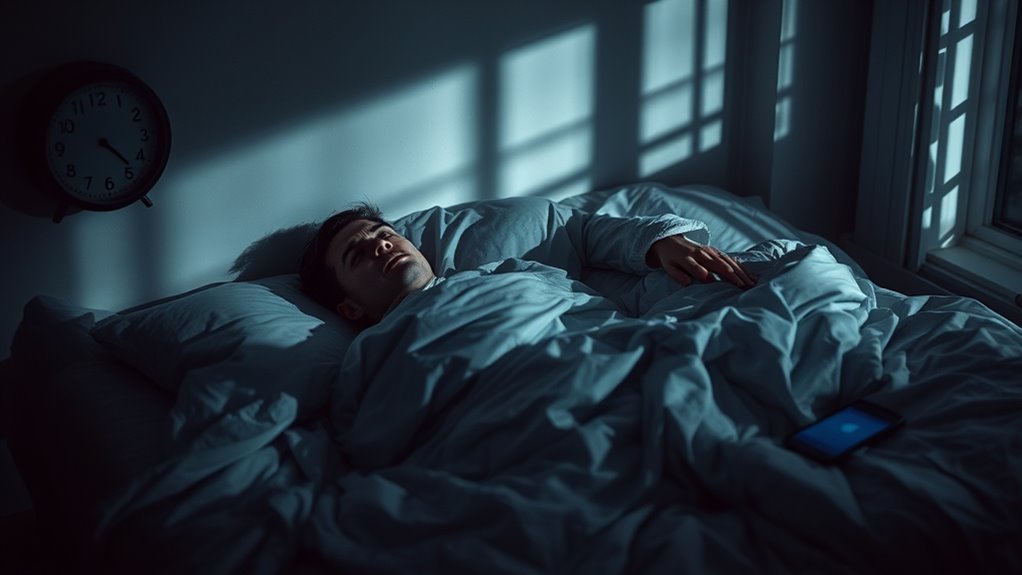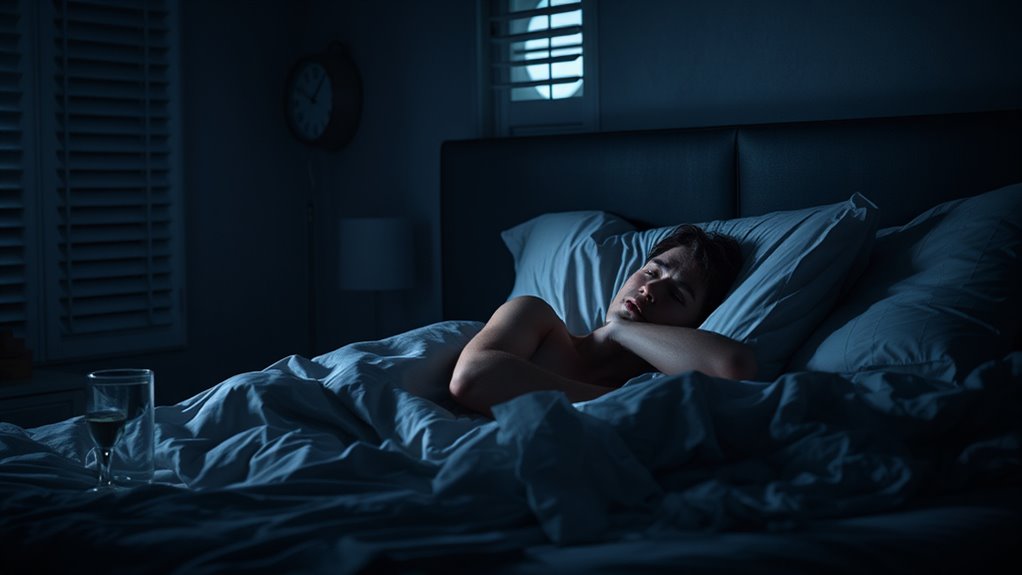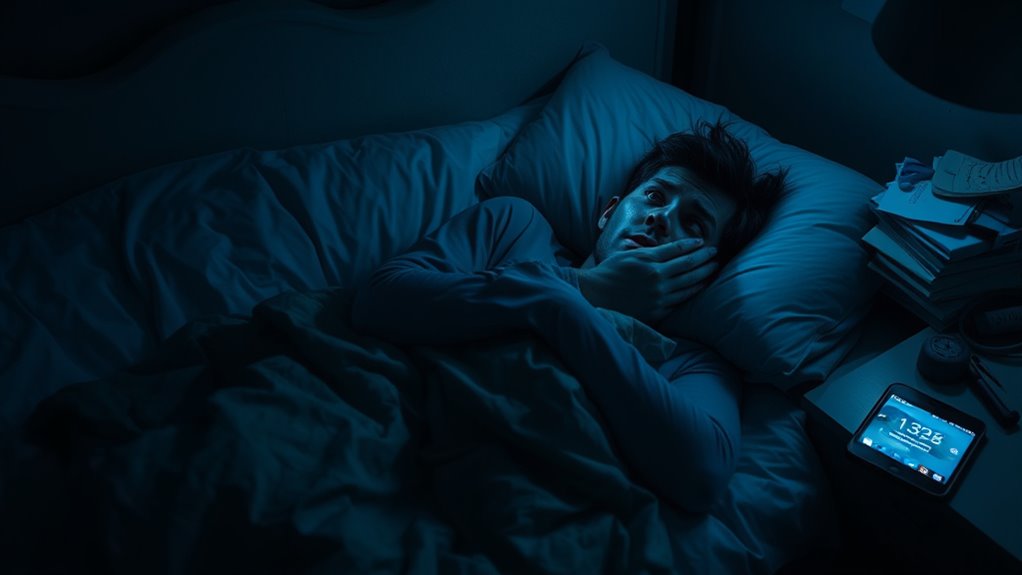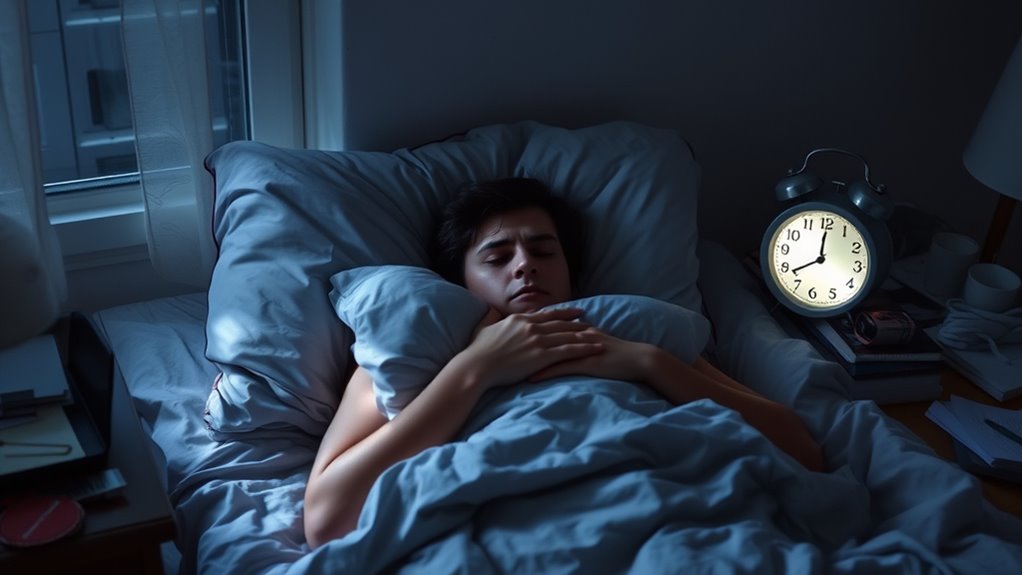Stress and anxiety activate your body’s fight-or-flight response, making it difficult to fall asleep and stay asleep. They boost stress hormones like cortisol and adrenaline, which disrupt your sleep cycles and reduce restorative sleep stages. Racing thoughts and heightened alertness caused by anxiety can lead to frequent awakenings and restless nights. If these feelings persist, your overall sleep quality suffers. Keep exploring to find effective ways to manage stress and improve your sleep patterns.
Key Takeaways
- Stress and anxiety activate the body’s stress response, releasing hormones that disrupt normal sleep cycles.
- Elevated cortisol and adrenaline levels hinder the ability to fall asleep and reduce REM and deep sleep stages.
- Racing thoughts and tension caused by anxiety make it difficult to relax and initiate sleep.
- Anxiety-related sleep disturbances often lead to fragmented sleep and decreased sleep quality.
- Persistent stress and anxiety can cause prolonged sleep disruptions, resulting in tiredness and impaired daytime functioning.
The Connection Between Stress, Anxiety, and Sleep Disruptions

Stress and anxiety often disrupt sleep because they activate your body’s stress response, making it hard to relax. When you’re anxious, your mind races, and tension builds, interfering with your ability to fall asleep. Incorporating mindfulness techniques, like deep breathing or meditation, can help calm your mind and reduce stress levels before bed. Improving sleep hygiene—such as maintaining a consistent sleep schedule, avoiding screens, and creating a calming bedroom environment—also supports better rest. These practices help signal to your body that it’s time to wind down, counteracting the effects of stress and anxiety. Additionally, understanding regional mental health resources can provide further support if stress and anxiety become overwhelming. By prioritizing mindfulness and sleep hygiene, you can create a routine that promotes relaxation and improves your overall sleep quality, even during stressful times.
How Stress Hormones Impact Sleep Cycles

When your body perceives a threat or feels overwhelmed, it releases stress hormones like cortisol and adrenaline that directly influence your sleep cycles. These hormones disrupt the hormonal regulation responsible for maintaining healthy sleep architecture. Elevated cortisol levels, especially at night, interfere with your ability to fall asleep and stay asleep, reducing REM and deep sleep stages. Adrenaline increases alertness, making it harder to relax and shift into restful sleep. Over time, this imbalance can cause fragmented sleep patterns and impair the natural progression of sleep cycles. Additionally, cybersecurity vulnerabilities during stressful periods can add to your anxiety, further disturbing sleep. By affecting hormonal regulation, stress hormones distort your sleep architecture, leading to lighter, less restorative sleep. Recognizing this connection helps you understand how stress impacts your sleep health and highlights the importance of managing stress for better sleep quality.
The Effects of Anxiety on Sleep Quality and Duration

Anxiety can considerably disrupt your sleep quality and reduce its overall duration, often making it difficult to fall asleep or stay asleep through the night. When your mind races with worries, sleep onset becomes a struggle, leading to prolonged periods of wakefulness. This heightened state of alertness can also impact dream recall, making dreams less vivid or harder to remember, as your brain remains in a hyperaroused condition. Over time, this cycle hampers restorative sleep, leaving you feeling tired and unrested. Anxiety’s interference with sleep quality isn’t just about falling asleep; it affects how deeply and continuously you sleep, which diminishes the overall restorative benefits of rest. Recognizing these effects is essential for addressing sleep disturbances linked to emotional stress. Additionally, incorporating mindfulness practices can help calm the mind and improve sleep quality by reducing brain fog and promoting relaxation.
Recognizing Signs of Sleep Disturbances Caused by Emotional States

Recognizing the signs of sleep disturbances linked to emotional states can help you identify when worries and stress are taking a toll on your rest. If you notice frequent nightmares or vivid dreams, it could be a sign that anxiety is disrupting your sleep. Keeping a dream journal allows you to track these patterns and understand how emotional stress influences your dreams. Additionally, trouble falling asleep or waking up multiple times during the night can indicate underlying emotional distress. Practicing relaxation techniques before bed, like deep breathing or progressive muscle relaxation, can help soothe your mind and reduce sleep disruptions. Incorporating sleeper-friendly routines into your nightly schedule can further improve sleep quality. Paying attention to these signs enables you to address emotional triggers early and take steps toward improving your sleep quality.
Strategies to Mitigate Stress and Anxiety for Better Sleep

To improve your sleep quality, implementing effective strategies to reduce stress and anxiety is essential. Start by practicing relaxation techniques like deep breathing, meditation, or progressive muscle relaxation to calm your mind before bed. Additionally, focus on maintaining good sleep hygiene: establish a consistent sleep schedule, create a relaxing bedtime routine, and keep your bedroom cool and dark. Avoid screens and caffeine close to bedtime, as they can heighten anxiety and disrupt sleep. Regular physical activity can also help manage stress, but avoid vigorous exercise near bedtime. By combining relaxation techniques with proper sleep hygiene, you create an environment that promotes relaxation, reduces anxiety, and fosters restful sleep. Voiceover techniques can also be employed to reinforce calming messages during sleep routines. These habits can considerably improve your sleep patterns and overall well-being.
Frequently Asked Questions
Can Stress and Anxiety Cause Long-Term Changes in Sleep Architecture?
Stress and anxiety can cause long-term changes in your sleep architecture, leading to persistent issues like sleep deprivation and dream disruption. When you’re constantly stressed, your body stays alert, making it hard to fall asleep or stay asleep. Over time, this can alter your sleep cycles, reducing restorative sleep stages. These changes may become ingrained, affecting your overall sleep quality and leaving you feeling tired and unrefreshed even after a full night’s rest.
How Does Chronic Stress Influence REM Sleep Patterns?
Chronic stress causes a cascade of chaos, disrupting REM sleep rhythms. You might notice dream disruption and difficulty reaching deep, restorative REM stages. This persistent pressure triggers hormonal imbalance, which interferes with your sleep cycle. As stress sustains, your REM sleep patterns become irregular, reducing the restorative benefits your dreams usually provide. Ultimately, ongoing stress sabotages your sleep quality, making restful nights rare and leaving you exhausted and unrefreshed each morning.
Are Certain Sleep Disorders Linked Specifically to Stress or Anxiety?
You might notice that nightmares and insomnia often link directly to stress and anxiety, making it harder to fall or stay asleep. These sleep disorders can worsen with ongoing worry, and sleep medication effects may provide temporary relief but don’t address the root causes. Managing stress through relaxation techniques or therapy can improve these conditions, helping you achieve more restful sleep without relying solely on medication.
What Role Does Genetics Play in Stress-Related Sleep Disturbances?
You might think genetics are irrelevant, but they play a subtle yet essential role. Genetic predispositions and hereditary factors influence how your body responds to stress, potentially making you more vulnerable to sleep disturbances. These inherited traits can amplify stress responses, disrupting your sleep patterns. So, while stress and anxiety directly affect sleep, your genetic makeup can predispose you to these issues, adding a layer of complexity that’s fundamental to understand.
Can Improving Sleep Hygiene Fully Counteract Stress-Induced Sleep Issues?
Improving your sleep hygiene can markedly reduce stress-induced sleep issues, but it might not fully eliminate them. Focusing on your sleep environment—like keeping it dark and quiet—and establishing consistent bedtime routines help signal your body it’s time to wind down. However, stress and anxiety can still disrupt sleep, so combining good sleep habits with stress management techniques offers the best chance for restorative sleep.
Conclusion
If you don’t tackle stress and anxiety, your sleep could turn into an endless rollercoaster, leaving you exhausted and lost in a fog of fatigue. Ignoring these emotional triggers might make your nights chaotic, like trying to sleep in a thunderstorm. But by taking steps to manage your worries, you can reclaim peaceful, restorative sleep—transforming your nights from a battleground into a tranquil sanctuary. Don’t let stress win—fight back for the sleep you deserve!









